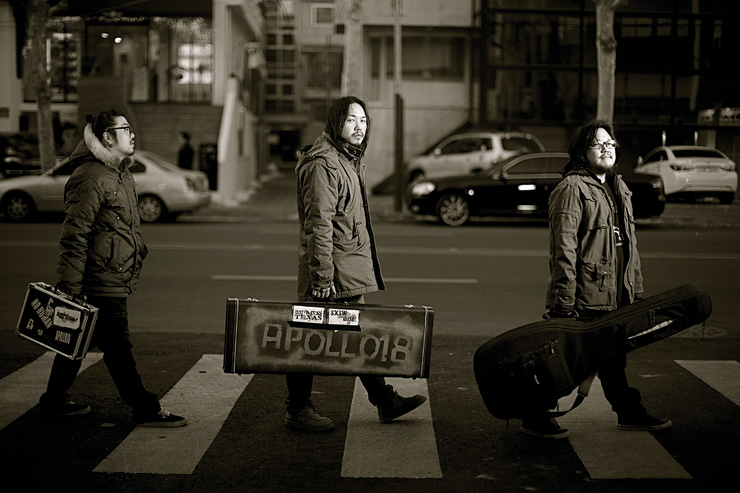 South Korean post-rock band Apollo 18.(LOS ANGELES USA) This spring, some of Seoul’s finest indie sensations will leave Hongdae to plug into America. Not only will four Korean bands play at the South by Southwest (SXSW) Festival in March, there will be a Korean act at the renowned Coachella Festival (April) for the first time. Oliver Saria introduces you to the most popular bands you probably don’t know and takes you inside Korea’s indie music scene.
South Korean post-rock band Apollo 18.(LOS ANGELES USA) This spring, some of Seoul’s finest indie sensations will leave Hongdae to plug into America. Not only will four Korean bands play at the South by Southwest (SXSW) Festival in March, there will be a Korean act at the renowned Coachella Festival (April) for the first time. Oliver Saria introduces you to the most popular bands you probably don’t know and takes you inside Korea’s indie music scene.
THIS MONTH, a handful of prominent South Korean music acts will tour the United States for the first time. And none of them will perform choreographed dance pop numbers with multiple costume changes. And “rock hard” won’t describe the band members’ abs, but rather what they do on stage. K-pop might be Korea’s biggest export besides economy cars, cell phones and female golfers, but an established indie rock scene is using social media to expand beyond Seoul’s eclectic Hongdae district to prove to the world that there is more to Korean music than just bubblegum ballads.
The South by Southwest (SXSW) Media and Music Conference in Austin, Texas, slated for March 16 to 20, will showcase the largest contingent of Korean acts in the event’s history. Four bands are scheduled to perform, including the atmospheric shoegaze of Vidulgi OoyoO, the electro-dance, high-energy rock hybrid of Idiotape, the wild party-rock of Galaxy Express, and the post-punk, post hardcore sonic assault of Apollo 18. Additionally, in April, the electronic performance art duo EE will be the first Korean act to perform at the renowned, days-long Coachella Valley Music and Arts Festival in Indio, California.
Vidulgi OoyoO, Idiotape and Galaxy Express will visit various cities as part of the Seoulsonic North American Tour, which kicked off in Toronto on March 9 during Canadian Music Week. Meanwhile, the ballsy band Apollo 18 plans to independently tour the South with stops in Texas, Louisiana, Arkansas and Oklahoma.
In other words, for the first time, American audiences from coast to coast will have a rare opportunity this spring to sample some of the best live acts in Korean indie music today. Depending on how well they’re received, the eyes (and ears) of the music world might very well turn towards Hongdae, the mecca of Korean indie.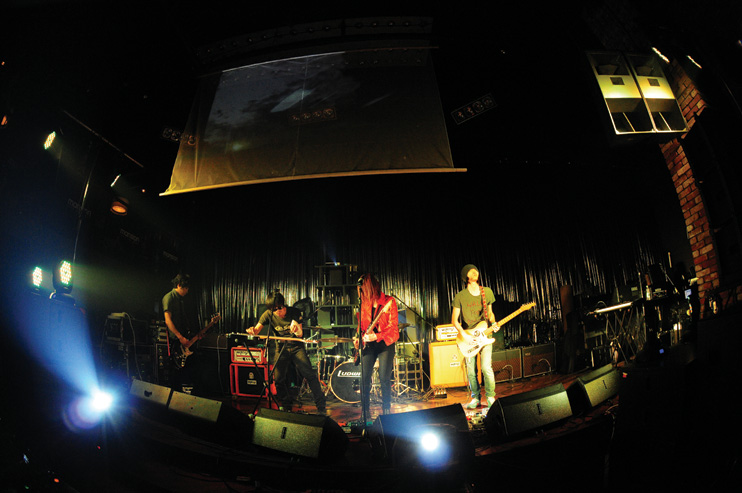 Shoegaze indie band Vidulgi OoyoO, photographed last month at Club Mansion in Seoul.THE MECCA
Shoegaze indie band Vidulgi OoyoO, photographed last month at Club Mansion in Seoul.THE MECCA
For all intents and purposes, “Korean indie” means anything outside the mainstream K-pop idol factory that dominates South Korea’s music industry. And there’s really only one place to find it. On any given night in the arty Hongdae neighborhood of northwest Seoul, one can find a club that caters to almost any musical taste.
According to Hyunjoon Shin, a professor at the Institute for East Asian Studies at Sungkonghoe University, the music scene in Hongdae started to take off in the mid-1990s as a result of globalization and increased access to Western culture. Bands like Nirvana in the States and Oasis in the U.K. influenced a generation of young musicians; soon, rehearsal spaces, recording studios and music venues began to spring up in the area, where rent was relatively cheap. The students attending Hongik University—arguably the country’s most prestigious art school and the area’s namesake (Hongdae is short for Hongik Daehakgyo)—provided a ready and eager audience as well as a fair number of budding musicians. Hip-hop and electronica spawned an explosion of nightclubs, and soon, the expats, artists and young people came flocking.
Unlike here in the United States, Hongdae has largely escaped the “hipster-fication” that has overrun indie music hotbeds such as the Silver Lake section of Los Angeles and Williamsburg in Brooklyn, where the streets are rotten with skinny jeans and hipsters sipping on Pabst Blue Ribbon. In Hongdae, hip-hop heads, jazz fans, rockers, ravers, salsa dancers and clubbers co-exist. Mark Russell, who in 2008 launched koreagigguide.com, an English-language blog about the Korean indie music scene, notes that Hongdae embodies an interesting aspect of Korean culture that he observed during his 10-plus years as a Canadian expat there. “One thing Seoul is very famous for is clustering,” says Russell, who is also the author of Pop Goes Korea: Behind the Revolution in Movies, Music, and Internet Culture (Stone Bridge Press, 2009). “If you want to buy bathroom fixtures, all the bathroom fixture stores are in one part of town. And it seems to have happened with the arts as well.”
So while the concentration of arts and music gives Hongdae its unique vibrancy, it also can make Hongdae feel very claustrophobic. And bands are often eager to break out beyond its confines, driven by both want and necessity.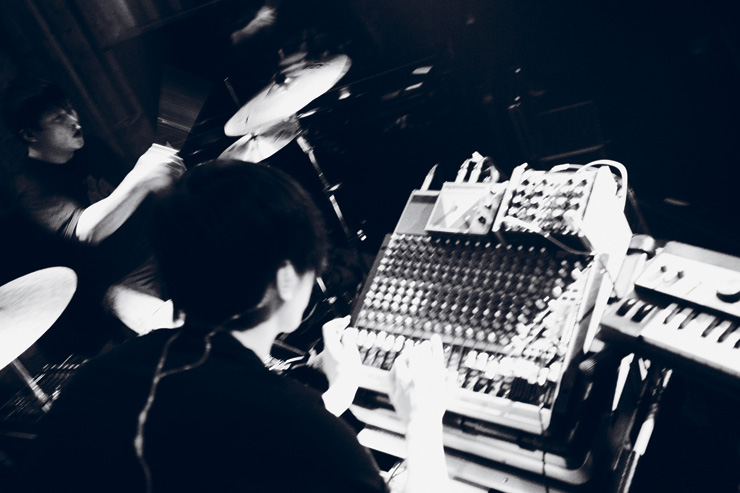 Electro-punk trio Idiotape. Photo Courtesy of Vu Entertainment & RecordsTHE MAVERICK
Electro-punk trio Idiotape. Photo Courtesy of Vu Entertainment & RecordsTHE MAVERICK
It’s two weeks prior to the start of the Seoulsonic tour and Bernie Cho, the president of DFSB Kollective, the creative agency producing the tour, is “crazy stupid busy” figuring out travel visas and work permits. On top of that, DR, Idiotape’s drummer, has just given himself whiplash from head-banging too hard during a recent performance. Ever the optimist, Cho insists, “The neck brace actually doesn’t look too bad as part of his stage outfit.”
Over the past two years, Seoulsonic has evolved from a quarterly concert series to an international tour and now a hub for Korea’s breakthrough music via the newly launched website, seoulsonic.kr. As Cho states, “These dynamic and diverse music acts have a wide range of options and opportunities to break out and break through whether it’s in Seoul or Korea or beyond.”
The fact of the matter is, Korean indie bands—in particular “alt-rok” bands, as they are dubbed in Korea—practically need to build an international audience in order to succeed beyond Hongdae. In Korea, the rock genre is still the obscure cousin of pop, dance and hip-hop, and other revenue streams such as product endorsements and television appearances aren’t readily available to its musicians.
More importantly, Korea’s dirty little secret is that the music industry often chews up its artists before spitting them out. In January, three of the five members of the hugely popular female idol group Kara announced they were suing their management agency over exploitative contracts. And South Korea’s Fair Trade Commission has recently ordered one agency to shorten the length of its 13-year contracts. The FTC has also investigated the country’s largest music portals amid allegations of price fixing. Sadly, the recent death of indie folk rocker Lee Jin-won from a brain hemorrhage in his tiny apartment has underscored how difficult it is for Korean musicians to survive off their art.
Cho and his fellow cohorts at DFSB’s wanted to do things differently, and hopefully better. They unabashedly formulated an artist-friendly, export-focused business model, squarely targeting international audiences through iTunes, which allows DFSB to pay artists a larger percentage of the profits. “The reality is,” states Cho, “we’re paying 15 times more per profit per download per artist.”
The key to success therefore is global exposure, but in the end the music speaks for itself.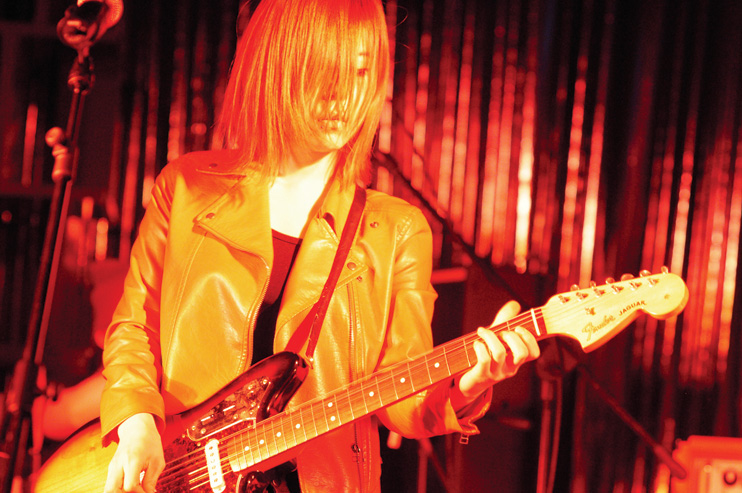 Jeehye Ham, guitarist and vocalist of Vidulgi OoyoO.THE MUSIC
Jeehye Ham, guitarist and vocalist of Vidulgi OoyoO.THE MUSIC
The members of Apollo 18 have attacked their self-produced regional tour the same way they’ve attacked their music: fearlessly. Bassist Daeinn Kim has said in previous interviews that the band wants to experience a bigger musical playground. When asked if they’re worried there might be bullies in the bigger playground, Kim states emphatically of his fellow band mates, guitarist Hyunseok Choi and drummer Sangyun Lee, “We’re not afraid of anything. On stage we enjoy our music, our sound. We don’t care about anything else, so we’re not afraid of anything.” They have reason to be confident. Last May they won Rookie of the Year at the 2010 Korean Music Awards. And Anna Lindgren of music blog indiefulrok.com has said of their virtuoso live performance and aggressive post-punk/math rock sound, “If there’s one Korean indie act that could tour the world today, Apollo 18 is it.”
They were actually invited to play SXSW last year, but could not afford to go. This year, however, they’re doing something a bit unprecedented in Korea: throwing a fundraiser. Korean culture generally frowns upon asking for money, but Apollo 18 has embraced a do-it-yourself approach, raising funds any way the band can, booking its own tour and finding innovative ways to promote its music. At SXSW, the band plans to hand out 500 iPhone covers with their band logo and contact information. Kim hopes to inspire others. “Any band in Korea can do this,” he advises. “Don’t be afraid!”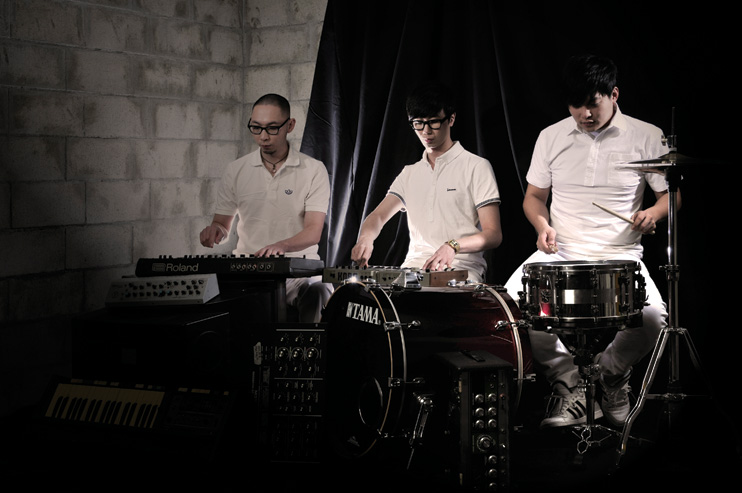 IdiotapeDguru of Idiotape has a similar sense of bravado. The band’s deejay says of their North American debut, “Americans will be shocked! We are not K-pop. Americans won’t think there is anything like us. It will be raw.” As the only electronic group on Seoulsonic’s rock-heavy line-up, he’s not worried that audiences won’t dance. They’ve proven their mettle opening for luminaries like Fat Boy Slim at the outdoor Korean music fest Global Gathering and impressing SWXW organizers at the Pentaport music festival with their brand of live electronica complete with full drum set and six or seven thoroughly thrashed synthesizers. Dguru is unapologetic when he states that he’s bored with Hongdae and ultimately wants to tour the world with his band mates, DR on drums and ZEZE on synth. But in the meantime, he’s content to have the North American crowds go completely crazy.
IdiotapeDguru of Idiotape has a similar sense of bravado. The band’s deejay says of their North American debut, “Americans will be shocked! We are not K-pop. Americans won’t think there is anything like us. It will be raw.” As the only electronic group on Seoulsonic’s rock-heavy line-up, he’s not worried that audiences won’t dance. They’ve proven their mettle opening for luminaries like Fat Boy Slim at the outdoor Korean music fest Global Gathering and impressing SWXW organizers at the Pentaport music festival with their brand of live electronica complete with full drum set and six or seven thoroughly thrashed synthesizers. Dguru is unapologetic when he states that he’s bored with Hongdae and ultimately wants to tour the world with his band mates, DR on drums and ZEZE on synth. But in the meantime, he’s content to have the North American crowds go completely crazy.
Galaxy Express knows a thing or two about going nuts. The party rockers pride themselves on playing each show as if it will be their last. Cho, of the DFSB Kollective talent agency, describes them this way: “They bring the sex appeal of The Killers with the slight psychosis of Spinal Tap.” They are considered the wildest live band in Korea. “When we take these guys abroad,” Cho states, “people were just floored. They do some sh-t on stage that people are just like, what the f-ck?”
Stage antics notwithstanding, the trio—JuHyun Lee (vocals/bass), JongHyun Park (vocals/guitar), and HeeKwon Kim (drums)—has also garnered a ton of critical praise. They won Rock Album of the Year at the 2009 Korean Music Awards, and this year they’re nominated for three more: Musician of the Year, Rock Song of the Year and Rock Album of the Year.
Vidulgi OoyoO (which means “pigeon milk”) is also a critical darling. JiHae Ham’s lush vocals and soaring guitar compliment her bandmates’ aural sound, which include JongSeok Lee (guitar/vocals), Ok Jihoon (bass/vocals) and YongJun Lee (drums). Their shoegaze style might be a bit more subdued than the other bands on the Seoulsonic tour, but their live music is mesmerizing. Though the band has recently hit a string of bad luck—(JongSeok broke his wrist slipping on some ice, and JiHae’s guitar was stolen days before her father was hospitalized)—they’ve bounced back with an even fuller sound for the Seoulsonic tour with the addition of backup guitarist Seunghoon Choi.
The electronic duo, EE, (E. Hyun Joon and E. Yunjung) blurs the line between music and performance art. The husband-and-wife team often presents surreal works with gaudy fashion and strange theatrics. But don’t expect Lady Gaga. Their work is a bit more challenging à la Grace Jones or Yoko Ono, but with more danceable beats.
Korean indie will perhaps never eclipse K-pop, but these bands, which represent some of the best of Korea’s independent music scene, will plug in for some of the most renowned music festivals and events worldwide. Though it remains to be seen if any band can make it beyond Hongdae on a grand scale, this spring, some could very well blossom on the American stage. And a slew of great bands in Hongdae are itching for a turn. As Bernie Cho puts it: “This is the first wave of cream of the crop artists that will have an opportunity to turn stereotypes inside out.”
* * *
Every scene needs its blogs.
For K-pop, there’s allkpop.com and soompi.com, among others. For Korean indie music, the two most informative English-language blogs are indiefulrok.blogspot.com and koreagigguide.com. Arguably, the most comprehensive Korean indie music blog is indiefulrok.com, created and maintained by a 20- something Swedish woman, Anna Lindgren. According to Bernie Cho, “She has scary insider knowledge of the Hongdae music scene” despite only infrequent trips to Korea and limited Korean language skills.
Other blogs worth checking out include koreanhomesickblues.podbean.com, which currently contains over 30 indie music podcasts created by British expat Dave Chandler, a journalist living in Seoul.
Also, Joseph Kim, vocalist/guitarist of Kite Operations, occasionally posts some of the most entertaining and insightful interviews of fellow musicians for his zine at K.O.A. records (www.koarecords.com).
SOURCE : www.iamkoream.com
ARTICLE BY: Oliver Saria
